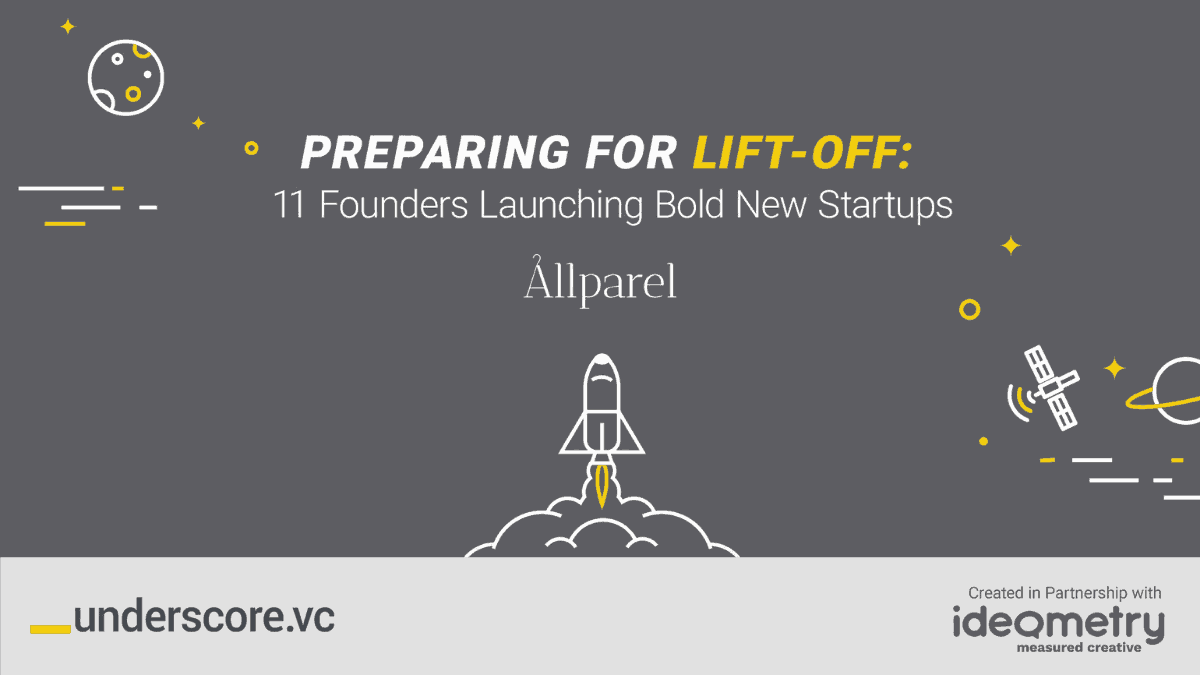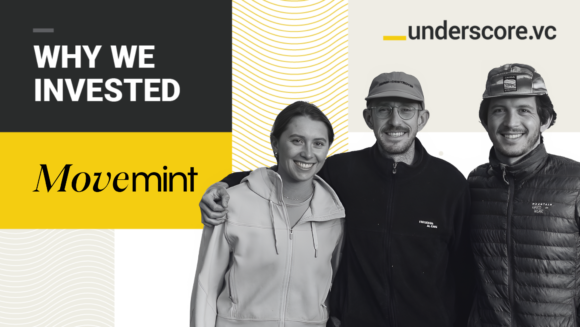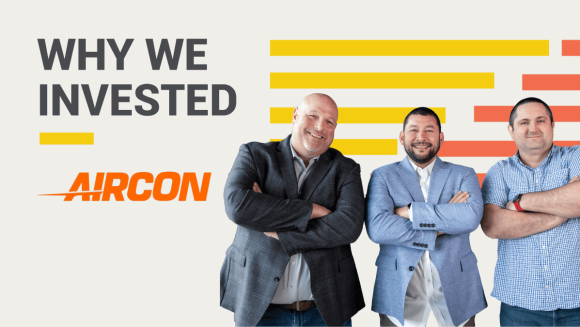This founder is giving product search technology a brand new style.
Our new blog series, “Preparing for Lift-Off: 11 Founders Launching Bold New Startups,” features exclusive interviews with the founders from the latest cohort of our UFirst Summer Accelerator program. We’re sharing their stories and the daring ideas that are moving their companies forward. We’re excited to be working with them this summer, and hope you enjoy hearing about their journeys thus far and where they’re headed.
This week, meet Sarah Wooders, founder of Allparel, whose AI innovation reinvents how you shop for clothes online and has the potential to transform product search technology as we know it.

Sarah grew up with duel loves for computer science and fashion. She never thought her two greatest passions would overlap until a fortuitous night of online shopping led her to a wide-spread problem: clothing-related product search technology was deeply flawed.
Fortunately, Sarah had the AI acumen to fix it. She realized she could use machine learning to tag products based on their image, rather than their description, which would make for far more accurate searches and far more happier shoppers. It’s a revelation with the potential to completely revamp how we search.
This is part 9 of 11 in our “Preparing for Lift-Off: 11 Founders Launching Bold New Startups” series created in partnership with growth marketing agency Ideometry. Tune in each week for another installment! Check out Part 8 with Valentina Toll Villagra and Kyle Dumont of AllSpice.
Tell us a bit about Allparel.
Sarah: The core technology of Allparel is using computers to automatically label clothing products based on the product image, rather than having to rely on the product description. So, given the product image, you can label things such as the color, sleeve length, neckline — anything that can be digitally identified.
I’ve built a consumer platform that aggregates products from lots of different retailers. Users can annotate all the products that come from places like Nordstrom, Macy’s, Asos, etc. It puts it all on one site, making it super accessible to shoppers. Allparel uses the computer-generated tags to match search queries and social requests — so you can get many more results than you would on another site.
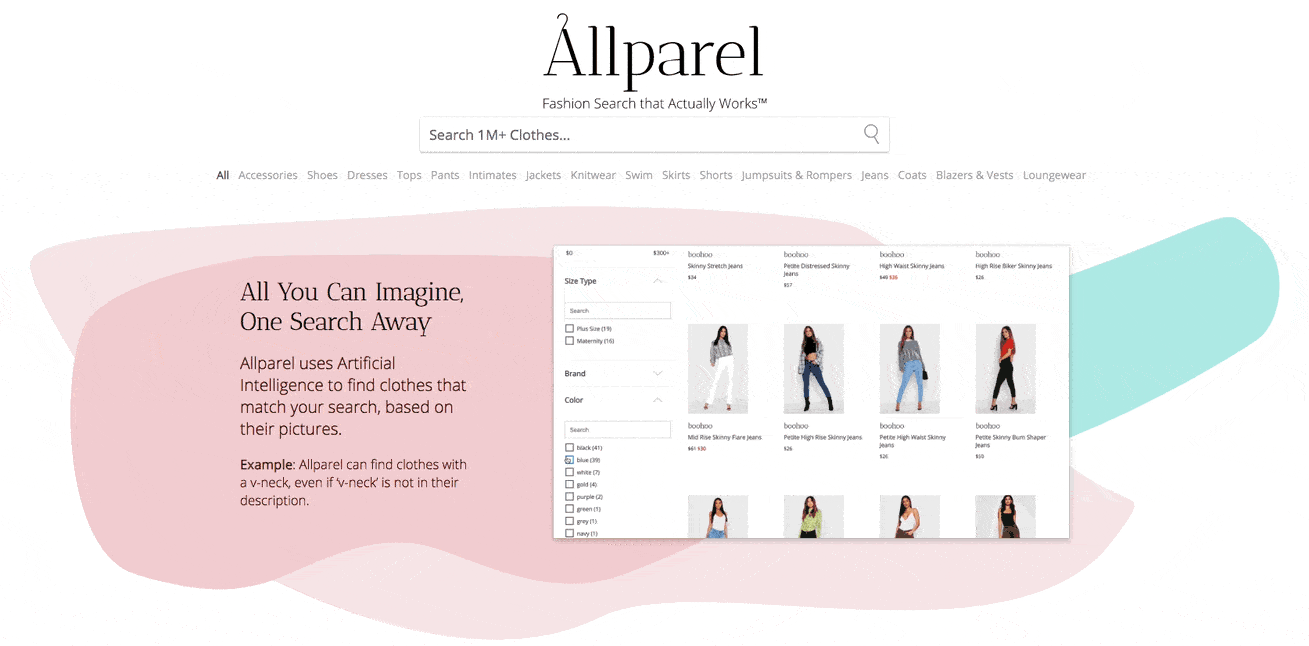
How did you come up with the idea?
Sarah: In my freshman year, I was shopping on Urban Outfitters’ website, looking for a cropped V-neck t-shirt. When I searched “cropped V-neck” in the search bar, only 2 or 3 results came up. But later on, I was scrolling through the site and there were tons of cropped V-neck shirts that never came up when I had searched for them earlier. I looked at the products more closely and realized the reason they didn’t show up in my search: neither the product titles nor descriptions said ‘cropped’ or ‘V-neck.’ So if I hadn’t happened upon them myself, I never would have found the product I was looking for, even though I was specifically seeking them out.
I realized this was probably happening all the time. So my idea was to redefine how we catalog products, making it more specific and accurate by relying on the product images. You can’t trust product descriptions to have all the information and be consistent but you can trust the product image. It has a lot of information — as long as you have a way to extract it.
''You can’t trust product descriptions to have all the information and be consistent but you can trust the product image. It has a lot of information — as long as you have a way to extract it'' - @sarahwooders, UFirst Fellow &… Click To TweetAt what point did you recognize that you had something you could build a business around, as opposed to just an interesting idea?
Sarah: There’s a lot of platforms like Shopstyle, Wish, Farfetch — I found those types of sites to be cluttered with confusing UI. I wanted a site that aggregates products like these other platforms but with a really good search and filtering mechanism. Whenever you have an aggregate site you always have millions and millions of products. If you don’t have good filters, you have a huge problem.
The more I worked on the idea the more I realized it was a problem for everyone. Retailers have to put so much work into annotating their products. Once you have a picture of a dress, for example, someone has to sit down and label all of the characteristics of the dress. If you could instead just have a computer do that, that would be really useful.
We can already search for clothes on Google and other basic search engines. Why is Allparel a different kind of product search tool? What makes it better?
Sarah: If you search on Amazon or Google, it is just looking at product titles and descriptions.
What makes Allparel different is that the tags on Allparel are also generated from the image. When you search with text, that text is being searched for in both the descriptions as well as the images.
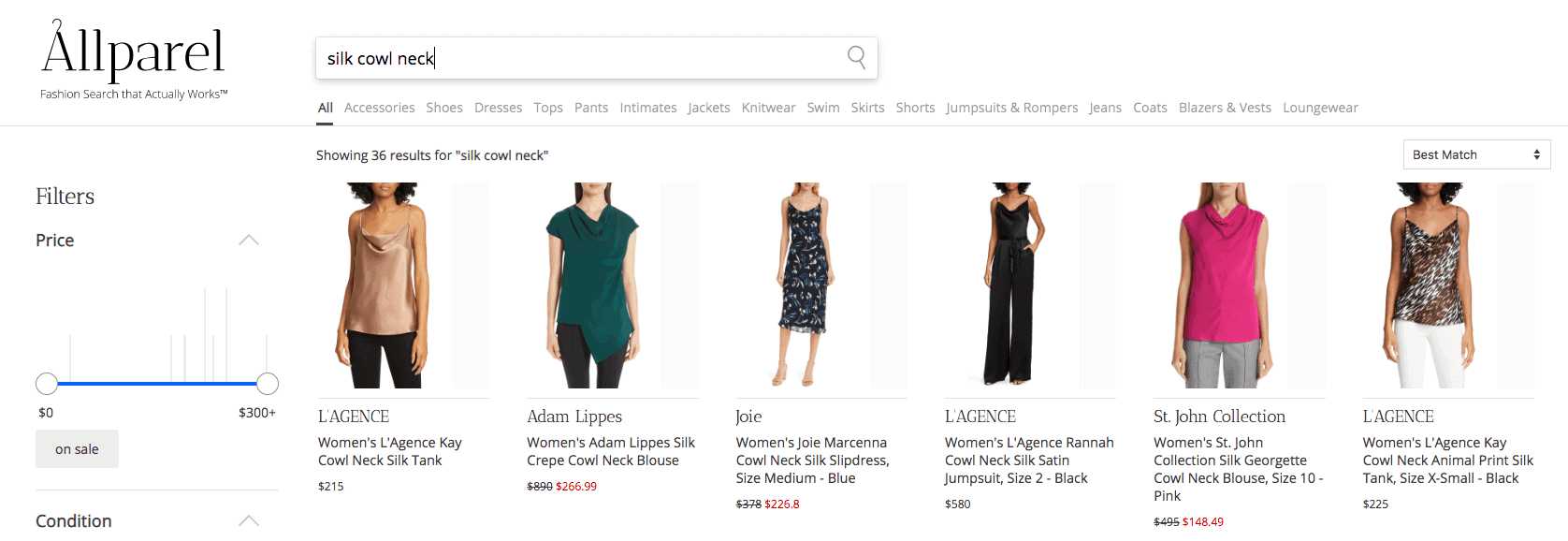
What drew you to UFirst? What are you hoping to get out of it?
Sarah: I really like the Underscore team and how friendly they are. With finding a VC, the most important thing is the mentorship. They’ve been so helpful and responsive. They’ll talk through my product from fundraising, recruiting, customer acquisition, and connecting me with people in the retail industry.
Prior to being selected for UFirst, how far along were you in building your start-up?
Sarah: Right now is a really great time for me to start working with UFirst. I recently finished my product beta. Now that I have this product, I’m ready to move forward with user acquisition and user feedback. I’m ready to connect with retailers, and UFirst has been very helpful with that.
What is your expectation at the close of the UFirst program? Where are you hoping to be after going through it?
Sarah: I’m trying to make a decision about whether I should be doing a B2C or B2B model. I could have my own website or I could license the technology to other companies. Over the summer I’m hoping to build a solid user base. As for retailers, it would be nice to have a couple using the technology to label their own product data.
Being an entrepreneur, what are some of the biggest challenges you’ve faced along the way?
Sarah: There’s a lot of challenges. I’m a team of one. I’ve done the vast majority of software development but also the business side. It’s been difficult juggling those two things — making sure the technology is moving forward but also promoting Allparel. It’s a huge technical project. There’s this huge machine learning system. The relationship between fashion and AI is increasing, but building a company around that is a little tricky too. A lot of investors see it as a retail company as opposed to a technology company. There’s always a lot of risks involved in being an entrepreneur — it’s extra scary for me because I’m by myself.
Starting a business is no easy task. What is the driving force that gets you out of bed every day and motivates you to build your business? What helps you stay focused?
Sarah: A lot of people question whether search is actually a problem. But, as a consumer, I feel like this is a big problem. And I’m not the only person who feels this way. I talk with tons of people about their shopping experiences. When they use Allparel and say that it saves them time, that keeps me motivated.
What’s the most valuable piece of advice you’ve received about being a founder?
Sarah: I have another friend who has made a lot of widely-used web apps. I was talking to him about how it is so embarrassing to have this website up that has bugs. He said that sometimes it makes sense to make a ranking of yourself and all your competitors. In doing that, you oftentimes realize that it’s not that bad.
Ideometry is a Boston-based full-service marketing agency serving a global client base. With a full suite of creative, development, and strategic services, Ideometry helps startups and Fortune 500 companies alike get the business results they’re looking for. If you’re doing something interesting, we’d love to hear from you. Get in touch with us at ideometry.com or email hello@ideometry.com
